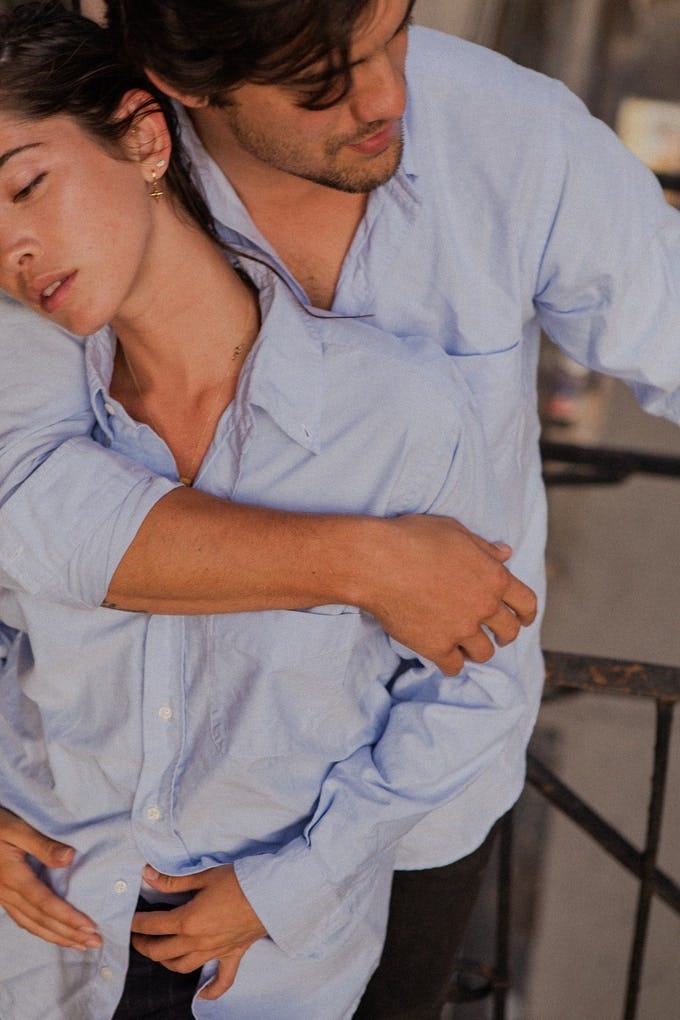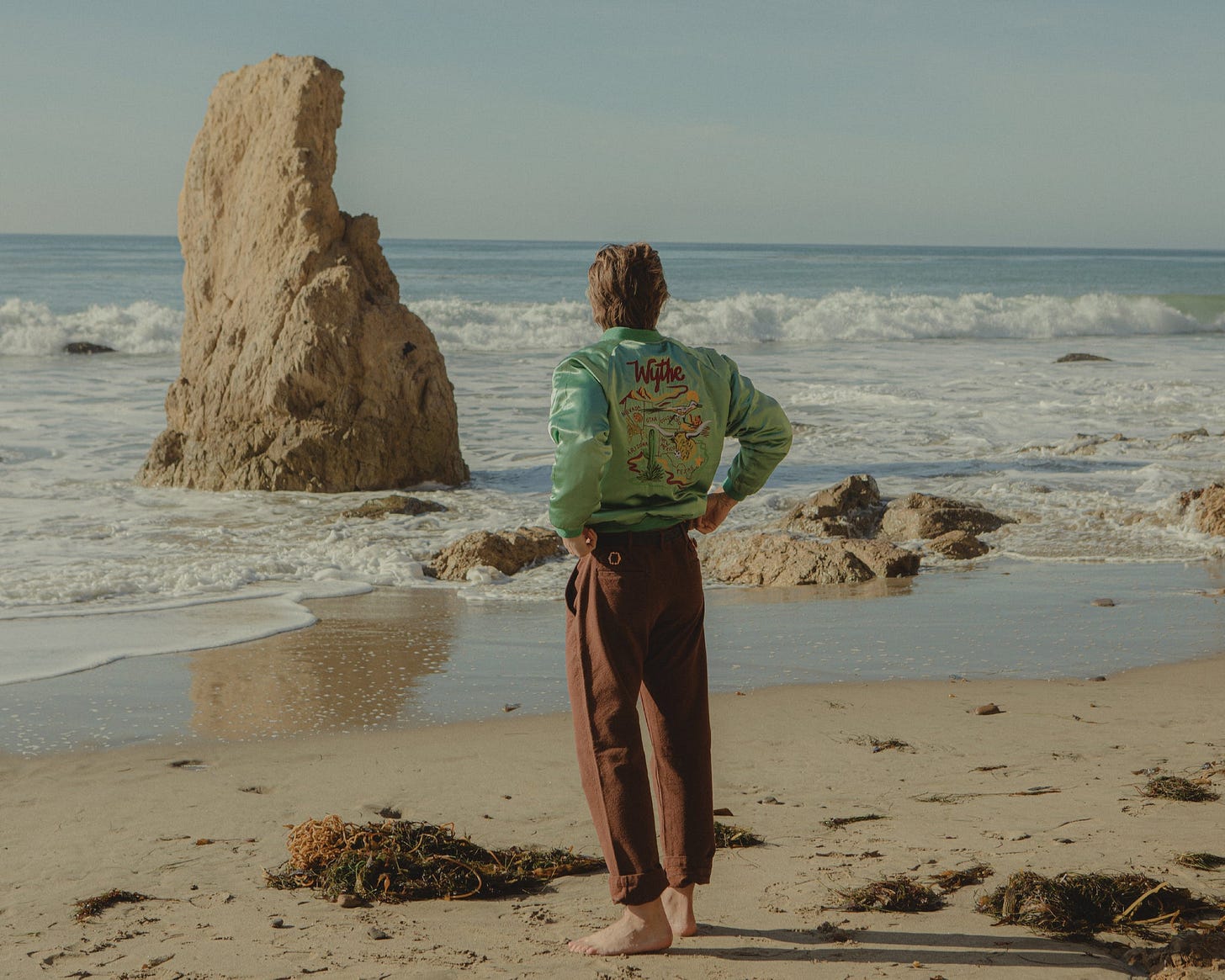How Wythe Recaptured the Dream of a Lost Americana
A small New York-based brand is reviving the spirit of bygone heirlooms.
Of all places, I first came across Wythe through a Kickstarter campaign in 2019. It was for an Oxford shirt—the sort of thing you could get just about anywhere, but something about it felt different. The fabric looked like it had lived through a few decades already. The proportions were just right, not overly slim nor vintage cosplay. The copy and accompanying imagery weren’t trying to sell you on the latest trend or some element of exclusivity. It felt honest. And deeply considered.
That first shirt hinted at what Peter Middleton was trying to do, but in hindsight, it also quietly laid the blueprint for the brand Wythe would become. In the years since, I’ve watched it grow from an independent project into a small team with a real cult following, and more importantly, a real point of view.
What sets Wythe apart isn’t just the product (though their flannels are excellent and the outerwear is beyond reproach). It’s the intent behind the product—the feeling that everything has a reason for being. Peter didn’t set out to start a brand; he just wanted to make a perfect shirt for him and his friends. When the factories gave him a minimum order requirement, a few of those friends encouraged him to crowdfund it. He hated the idea—called it “the biggest ego death imaginable.” But it forced him to take a leap and tell his story. And that story resonated.
“It made me realize how important the story was to the shirt,” he said. “The more I worked on it, the clearer it became that the details mattered not just technically, but emotionally. It wasn’t just about making something. It was about making it matter.”

Wythe has always felt different from the rest of the menswear landscape because it’s not trying to reverse-engineer some elusive coolness. It’s not about styling an aesthetic from a Pinterest board or recreating archive pieces. It’s about understanding the soul of a garment—why it looked and functioned a certain way—and then reimagining it for modern life. Not through superfluous, gratuitous design choices, but through care. “I’m not doing repro,” Peter told me. “I want to know what made this piece matter. And then I want to make that for today.”
There’s also a boldness to Wythe, but it doesn’t show up in loud logos or impractical, exaggerated silhouettes. It shows up in the calculated risks. A pink shirt that no one asked for but turns out to be exactly what you needed. A custom flannel developed from scratch to feel like something your grandfather wore for thirty years straight. A tie-dyed, faux-vintage concert tee that, as crazy as it sounds, somehow feels like the real thing.
The lookbooks are less marketing material and more emotional exhale: this is the story, take it or leave it. “There’s a vulnerability to it,” Peter said. “Every lookbook feels like a moment of: here’s everything that’s been in my head for the last year—will it land? Will it connect? And if it doesn’t, that’s okay. But you still feel it.”
Peter comes from a fabric background—he worked at Ralph Lauren developing textiles for the women’s collection—and that attention to detail shows. Wythe fabrics don’t feel like anyone else’s because they aren’t. He doesn’t pull from mill stock. He builds from the yarn up. It’s a costly and time-consuming approach, but it’s why you can spot a Wythe piece on a crowded rack without needing to check the label.
“I want everything we make to feel like something you’d find at a vintage store and wonder where it came from,” he said. “The goal is that you could mix up a rack with 30 other brands and still know which piece is ours—just from the fabric, the hand feel, the silhouette.”
The brand’s physical space opened a little over a year ago in Manhattan’s Lower East Side, and it feels like a natural extension of the clothes: warm, unhurried, personal. Every time I’ve visited, I’ve stayed longer than I planned. There’s incense burning, music playing, friends stopping by, and plenty of clothes hanging on the walls like artifacts. It’s one of the few stores that feels like a clubhouse without trying too hard—every brand’s dream.
Peter didn’t originally want to open a store. “I always thought of myself as not a retail guy,” he said. “But people kept telling me: you’re building a world here, and people need a way to walk into it. You can only get so much from a lookbook or a website. Sometimes you need to step inside.”
There’s a lot of talk about heritage in menswear—what it means, who gets to claim it, and whether it still matters. Wythe doesn’t seem concerned with any of that. It's not post-heritage or anti-heritage. It's just... honest. It cares deeply about the past, but only as far as it can inform the present. That 2019 Oxford was supposed to be a one-off. Just 50 shirts. A personal project with no plans for more. But sometimes the right ideas take on lives of their own.









beautiful write up, nico.
Oxfords look great. Been wanting to try them for a while, but think they’d just be too long to wear untucked.